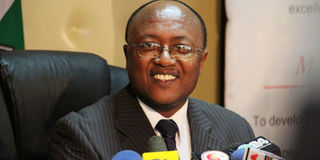Taskforce to explore 4G spectrum-sharing options

ICT Principal Secretary Joseph Tiampati. The government has appointed a task force to prepare a spectrum-sharing model among mobile operators for the roll-out of the 4G network. PHOTO | DIANA NGILA | FILE
What you need to know:
- Safaricom chief executive Bob Collymore said the roll out of a robust 4G network is instrumental to the success of the government’s ambition to have Internet in all public schools because of its enhanced capacity compared to the 3G option.
The government has appointed a task force to prepare a spectrum-sharing model among mobile operators for the roll-out of the 4G network.
In an interview with The Sunday Nation, Information, Communication and Technology Principal Secretary Joseph Tiampati said the team will begin work immediately and is expected to deliver its recommendation to the government in two months.
The 10-member task force includes officials from the ICT ministry, Communications Commission of Kenya and private sector representatives, and is required hold extensive consultations with relevant stakeholders in the industry.
“Spectrum is a national resource that must be managed and used openly to benefit the whole country. We expect the team to come up with the best option,” Mr Tiampati said.
The move comes barely two months after Safaricom requested to be allocated frequency to roll out its own 4G network, promising to provide free Internet connectivity to public primary schools under the government’s one laptop per child project.
Also known as Long Term Evolution (LTE) network, 4G gives users faster internet speeds and improved internet capabilities.
Safaricom chief executive Bob Collymore said the roll out of a robust 4G network is instrumental to the success of the government’s ambition to have Internet in all public schools because of its enhanced capacity compared to the 3G option.
“If you want to connect schools, upgrading to the 4G is inevitable,” Mr Collymore said in an interview.
FREE UP FREQUENCIES
However, the roll-out of the 4G network is pegged on the migration from analogue to digital television broadcasting — a process that will free up the frequency bandwidth to be occupied by the mobile network.
The government had set December 13 as the date for Nairobi to switch from analogue to digital platform, but the process has been put on hold pending determination of a court case filed by local media houses.
The High Court will rule on the matter on December 23.
In appointing the new task force, the government is seen to be admitting to having failed in its attempt to roll out an open-access 4G network through a Public Private Partnership (PPP), despite spending a considerable sum of taxpayers’ money on the project.
While Mr Tiampati maintained the option of the PPP is still viable, some members of the consortium that had been formed to steer the roll-out have expressed displeasure with its constitution.
Last year, the government launched the search for a financial consultant to help in the formation of the Public Private Partnership to roll out high-speed connectivity on a 4G platform, which was never formalised.





